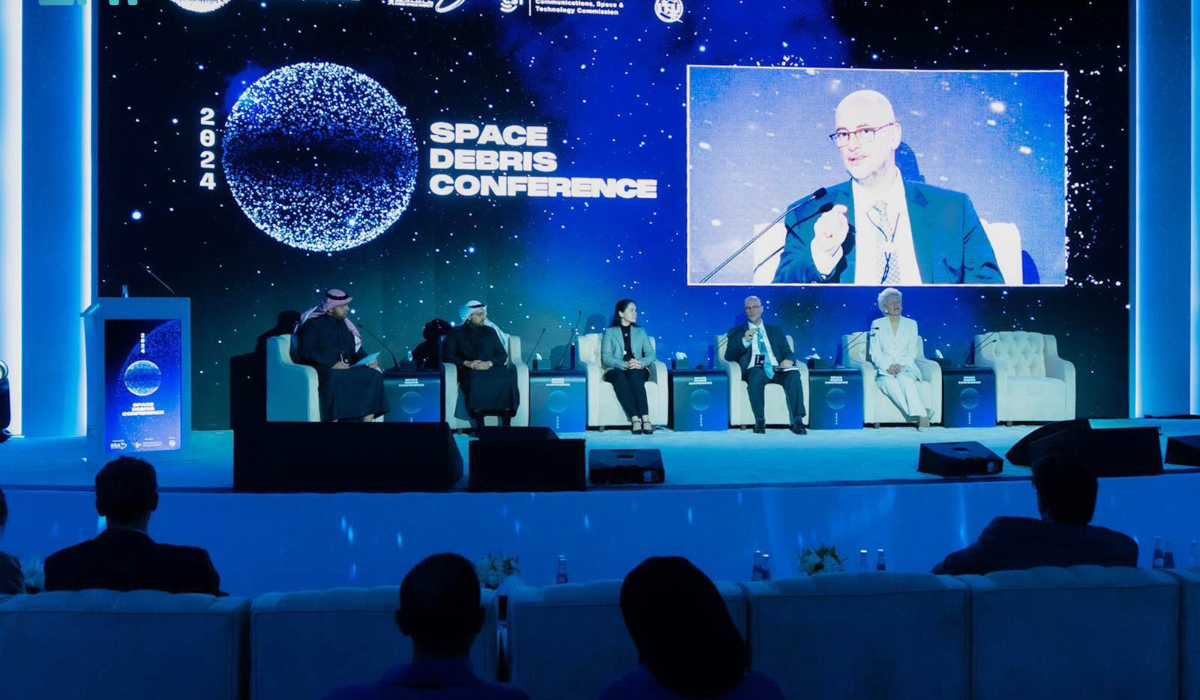RIYADH: Saudi Arabia is playing a key role in promoting international efforts to counter the growing threat posed by space debris, a global forum in Riyadh has been told.
More than 260 leaders, experts, and speakers from more than 50 countries took part in the Space Debris Conference, themed “Securing the Future of the Global Space Economy,” which concluded on Monday.
The conference and its activities highlight efforts by the Kingdom to understand the challenges and risks associated with space debris, and to adopt policies to protect the economic future of the space sector.
HIGHLIGHT
Participants emphasized the importance of finding technological solutions to the threat, and called for the protection of space for future generations. They stressed the need to address the debris challenge and develop an intergenerational charter leading to space sustainability.
Organized by the Saudi Space Agency in collaboration with the Communications, Space and Technology Commission, the International Telecommunication Union, and the UN Office for Outer Space Affairs, the conference included four discussion sessions and four keynote speeches addressing legislation and future trends in confronting the problem of space debris.
Participants emphasized the importance of finding technological solutions to the threat, and called for the protection of space for future generations. They stressed the need to address the debris challenge and develop an intergenerational charter leading to space sustainability.
A set of ideas for future solutions aimed at eliminating risks and securing Earth was presented, reflecting the Kingdom’s commitment to strengthening cooperation to achieve space sustainability and progress. This effort is focused on developing the space economy and stimulating space innovations to serve both the Kingdom and humanity as a whole.

More than 260 leaders, experts, and speakers from more than 50 countries took part in the Space Debris Conference, which concluded in Riyadh on Monday. (SPA)
The Kingdom, represented by the Saudi Space Agency, aims to strengthen its position among the leading countries in the field of space through this conference, the first of its kind in the region. It seeks to achieve this by conducting numerous scientific research and explorations to serve humanity. Through these endeavors, the Kingdom is working to affirm its commitment to protecting the planet and shaping new horizons in the space field.
The first keynote speech of the conference’s second day, titled “Mission to Remove Space Debris from Earth’s Orbit,” was delivered by Luc Piguet, CEO of ClearSpace, a company specializing in space debris removal.
He touched on efforts to remove space debris, which poses an increasing threat to Earth’s orbit and space systems, revealing that the first request for space debris removal was made to his company in 2019 by NASA, adding that the cost of removing a single piece can reach more than $100 million, and calling for global solutions and deepening international cooperation to confront this challenge.
Regarding “Space Debris Mitigation and Removal,” the session discussed efforts made by King Abdulaziz City for Science and Technology, including developing satellite technologies and their remote sensing feature and making improvements on robots to ensure their future employment in space debris removal.
Session participants explained that the increase in space debris is directly linked to increased risks that may affect important terrestrial services such as the Internet and scientific research, in addition to their impact on the climate and the economy. Speakers called on countries and government to enact binding laws that hold operators responsible and obligate them to find solutions.
Marshall Kaplan, chief operating officer at Launchspace Services, highlighted the latest innovations and developments in the field of effective debris removal technologies that offer solutions to the problem according to many experts in the sector.
Kaplan suggested that the Saudi Space Agency lead a global initiative to launch brainstorming meetings with the world’s leading minds and innovative entrepreneurs to find new technologies to deal with the problem of space debris, given the Kingdom’s leadership in this important file.”
Kevin O’Connell, founder and CEO of Space Economy Rising, praised the Kingdom for taking the lead in seeking to unify global efforts to address the issue of space debris.
O’Connell said that international agreements, such as the Outer Space Treaty of 1967, seek to restrict the militarization of space and maximize its peaceful uses.
“We are now witnessing a great deal of investment activity around the world with the flourishing of the space sector, robotics and space technologies for the peaceful use of outer space,” he added.
On the opening day, the conference began its first session with a panel discussion titled “Beyond Borders, Beyond Debris: Space Agencies Unite for a Sustainable Space Future.”
The second panel, hosted by the UNOOSA and titled “Translating Policy into Progress,” shed light on the roles the office seeks to undertake, including the development of new technologies to contribute to mitigating the issue of space debris. Participants noted that space is equally accessible to all, making cooperation imperative for the benefit of all humanity.
The third panel discussion, titled “Role of Licensing Bodies,” explored the Kingdom’s role as a key player in addressing the challenge of space debris.


























